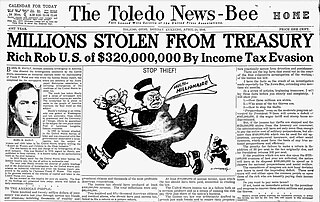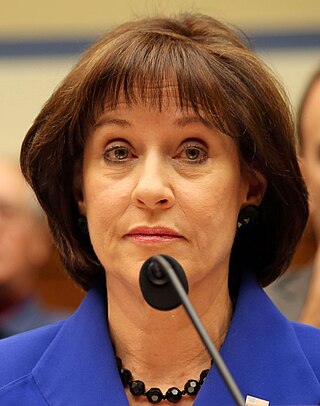Related Research Articles

The Serious Fraud Office (SFO) is a non-ministerial government department of the Government of the United Kingdom that investigates and prosecutes serious or complex fraud and corruption in England, Wales and Northern Ireland. The SFO is accountable to the Attorney General for England and Wales, and was established by the Criminal Justice Act 1987, an Act of the Parliament of the United Kingdom.
The acting U.S. attorney for the District of New Jersey is the chief federal law enforcement officer in New Jersey. On January 9, 2025, Vikas Khanna assumed the role as acting U.S. attorney. The U.S. District Court for the District of New Jersey has jurisdiction over all cases prosecuted by the U.S. attorney.

William Pelham Barr is an American attorney who served as United States attorney general in the administration of President George H. W. Bush from 1991 to 1993 and again in the first administration of President Donald Trump from 2019 to 2020.

Internal Revenue Service, Criminal Investigation (IRS-CI) is the United States federal law enforcement agency responsible for investigating potential criminal violations of the U.S. Internal Revenue Code and related financial crimes, such as money laundering, currency transaction violations, tax-related identity theft fraud and terrorist financing that adversely affect tax administration. While other federal agencies also have investigative jurisdiction for money laundering and some Bank Secrecy Act violations, IRS-CI is the only federal agency that can investigate potential criminal violations of the Internal Revenue Code, in a manner intended to foster confidence in the tax system and deter violations of tax law. Criminal Investigation is a division of the Internal Revenue Service, which in turn is a bureau within the United States Department of the Treasury.

This article about dismissed U.S. attorneys summarizes the circumstances surrounding a number of U.S. attorneys dismissed from office in the United States Department of Justice in 2006. Eight were dismissed In December 2006, and others may have been forced out of office under similar circumstances in 2005 and 2006. The manner of the firings, the congressional response to them, and the explanations offered by Bush administration officials are aspects of a political controversy starting in the first quarter of 2007. As of May 2007 a clear explanation of why the attorneys were dismissed had not been put forward by the Bush administration or the Department of Justice leadership. There are in total 93 U.S. attorneys that serve 94 Federal district courts.

Rod Jay Rosenstein is an American attorney who served as the 37th United States deputy attorney general from 2017 to 2019. Prior to his appointment, he served as a United States attorney for the District of Maryland. At the time of his confirmation as deputy attorney general in April 2017, he was the longest-serving U.S. attorney. Rosenstein had also been nominated to the United States Court of Appeals for the Fourth Circuit in 2007, but his nomination was never considered by the U.S. Senate.

Honest services fraud is a crime defined in 18 U.S.C. § 1346, added by the United States Congress in 1988. The idea of this law was to criminalize not only schemes to defraud victims of money and property, but also schemes to defraud victims of intangible rights such as the "honest services" of a public official.

Rufus Seth Williams is a former district attorney of the city of Philadelphia. He began his term January 4, 2010. He formerly served as an assistant district attorney. Williams was the first African-American district attorney in Philadelphia and in the Commonwealth of Pennsylvania. On March 21, 2017, Williams was indicted on 23 counts of bribery, extortion, and fraud. His trial began June 19, 2017. He resigned and pleaded guilty to one charge on June 29, 2017.

Under the federal law of the United States of America, tax evasion or tax fraud is the purposeful illegal attempt of a taxpayer to evade assessment or payment of a tax imposed by Federal law. Conviction of tax evasion may result in fines and imprisonment. Compared to other countries, Americans are more likely to pay their taxes on time and law-abidingly.

In 2013, the United States Internal Revenue Service (IRS), under the Obama administration, revealed that it had selected political groups applying for tax-exempt status for intensive scrutiny based on their names or political themes. This led to wide condemnation of the agency and triggered several investigations, including a Federal Bureau of Investigation (FBI) criminal probe ordered by United States Attorney General Eric Holder. Conservatives claimed that they were specifically targeted by the IRS, but an exhaustive report released by the Treasury Department's Inspector General in 2017 found that from 2004 to 2013, the IRS used both conservative and liberal keywords to choose targets for further scrutiny.

Lois Gail Lerner is an American attorney and former United States federal civil service employee. Lerner became director of the Exempt Organizations Unit of the Internal Revenue Service (IRS) in 2005, and subsequently became the central figure in the 2013 IRS targeting controversy in the targeting of politically aligned groups, either denying them tax-exempt status outright or delaying that status until they could no longer take effective part in the 2012 election. On May 10, 2013, in a conference call with reporters, Lerner apologized that Tea Party groups and other groups had been targeted for audits of their applications for tax-exemption. Both conservative and liberal groups were scrutinized. Only three groups—all branches of the Democratic group Emerge America—had tax exemptions revoked. Lerner resigned over the controversy. An investigation by the U.S. Department of Justice and Federal Bureau of Investigation, completed in 2015, found "substantial evidence of mismanagement, poor judgment and institutional inertia" but "found no evidence that any IRS official acted based on political, discriminatory, corrupt, or other inappropriate motives that would support a criminal prosecution".

The resolution H.Res. 565, "Calling on Attorney General Eric H. Holder, Jr., to appoint a special counsel to investigate the targeting of conservative nonprofit groups by the Internal Revenue Service," was passed by the United States House of Representatives during the 113th United States Congress. The simple resolution asks U.S. Attorney General Eric Holder to appoint a special counsel to investigate that 2013 IRS scandal. The Internal Revenue Service revealed in 2013 that it had selected political groups applying for tax-exempt status for closer scrutiny based on their names or political themes.

H.Res. 574, officially titled Recommending that the House of Representatives find Lois G. Lerner, Former Director, Exempt Organizations, Internal Revenue Service, in contempt of Congress for refusal to comply with a subpoena duly issued by the Committee on Oversight and Government Reform, was a simple resolution that passed in the United States House of Representatives during the 113th United States Congress. The resolution was in response to the testimony of Lois Lerner, a former Internal Revenue Service (IRS) employee, who was at the center of the then-ongoing 2013 IRS controversy over the agency's targeting of selected political groups applying for tax-exempt status. The resolution held Lerner in contempt of Congress for refusing to testify at a congressional hearing.
In 2015, United States federal prosecutors disclosed cases of corruption by officials and associates connected with the Fédération internationale de Football Association (FIFA), the governing body of association football, futsal and beach soccer.

The Robert Mueller special counsel investigation was an investigation into 45th U.S. president Donald Trump regarding Russian interference in the 2016 United States elections and was conducted by special prosecutor Robert Mueller from May 2017 to March 2019. It was also called the Russia investigation, Mueller probe, and Mueller investigation. The investigation focused on three points:
- Russian interference in the 2016 United States elections
- Trump associates and their connection to Russian officials and espionage
- Possible obstruction of justice by Trump and his associates

The trial of Benjamin Netanyahu, also known as the Netanyahu-Elovitch-Moses Trial or the Publisher's Trial, began following investigations into allegations of bribery, fraud, and breach of trust by him and close political allies within his inner circle during his fourth and fifth terms as Israel's prime minister. The Israel Police began investigating Netanyahu in December 2016 and subsequently recommended indictments against him.
This is a timeline of events in the first half of 2019 related to investigations into the many suspicious links between Trump associates and Russian officials and spies relating to the Russian interference in the 2016 United States elections. It follows the timeline of Russian interference in the 2016 United States elections, both before and after July 2016, until November 8, 2016, the transition, the first and second halves of 2017, the first and second halves of 2018, and followed by the second half of 2019, 2020, and 2021.
This is a timeline of events from 2020 to 2022 related to investigations into the many suspicious links between Trump associates and Russian officials and spies relating to the Russian interference in the 2016 United States elections. It follows the timeline of Russian interference in the 2016 United States elections, both before and after July 2016, until November 8, 2016, election day, the transition, the first and second halves of 2017, the first and second halves of 2018, and the first and second halves of 2019.

Richard Donoghue is an American attorney and prosecutor who served as the acting United States deputy attorney general from December 2020 to January 2021. Previously, he served as the principal associate deputy attorney general in 2020 and as United States attorney for the Eastern District of New York from 2018 to 2020. Donoghue was appointed interim U.S. Attorney by Jeff Sessions in January 2018.
References
- 1 2 "Richard Pilger". LinkedIn . Archived from the original on November 10, 2020. Retrieved November 10, 2020.
- ↑ Fowler, Kate (November 10, 2020). "Who is Richard Pilger? DOJ's head of election crimes resigns". HITC. Retrieved November 10, 2020.
- 1 2 3 "Richard C. Pilger". PLI.edu. Practising Law Institute. Archived from the original on November 10, 2020. Retrieved November 10, 2020.
- ↑ "Richard Pilger". Politician Compare. February 13, 2020. Retrieved November 10, 2020.
- ↑ "Richard Pilger". Ballotpedia . Retrieved November 10, 2020.
- ↑ Wood, Robert W. (December 10, 2014). "Obama Justice Department Was Involved In IRS Targeting, Lerner Emails Reveal". Forbes . Retrieved November 10, 2020.
- ↑ Treasury Inspector General for Tax Administration (September 28, 2017). "Review of Selected Criteria Used to Identify Tax-Exempt Applications for Review" (PDF). Treasury.gov. United States Department of the Treasury . Retrieved November 10, 2020.
- ↑ Benner, Katie; Schmidt, Michael S. (November 10, 2020). "Barr Hands Prosecutors the Authority to Investigate Voter Fraud Claims". The New York Times . ISSN 0362-4331 . Retrieved November 10, 2020.
- 1 2 Villarreal, Daniel (November 9, 2020). "DOJ's election crimes director resigns after Barr authorizes election fraud investigation". Newsweek . Retrieved November 10, 2020.
- ↑ Perez, Evan (November 10, 2020). "Top prosecutor quits after Barr election fraud order". CNN. Retrieved November 10, 2020.